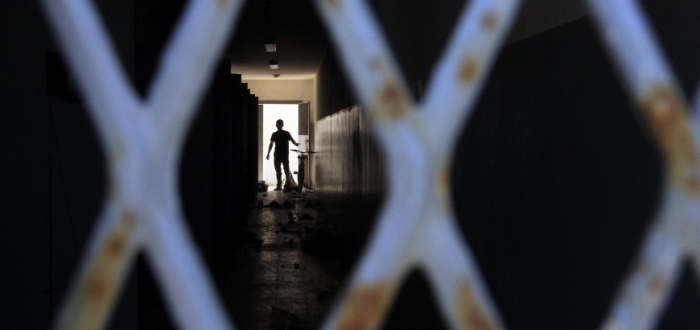In June of 2012, President Bashar al-Assad's forces launched a campaign of arbitrary arrest in the city of Saqba in the suburbs of Damascus. Everyone in the street was arrested, and among those arrested was the detainee "A. H", who refused to disclose his real name out of fear.
A. H was born in Saqba in 1967. He was arrested by regime forces in front of his home in the mass arrests campaign and was later accused of working with the Coordination Committees for transporting demonstrators to field hospitals. A. H says he was taken to the Military Security branch in Damascus where he spent a period of time, and then to the Military Police branch in Al-Qaboun, and then to Branch 227 in Kafar Sousseh, before finally arriving at the prison of the Mezzeh Military Airport.
A. H narrates what he saw in the airport prison; the details of his arrest and the torture and humiliation he suffered with his companions. He confirms he witnessed the death of 124 people in his cell during the 52 days of his arrest in Branch 227, and that one of them was beaten to death because he refused to confess to the charges against him, while the rest "died of skin diseases or gangrene as a result of beating and lack of treatment."
A. H adds that among the victims, "there was a young man from Daraya; he was killed by a military doctor, a colonel, because they were from the same city. His legs were infected by gangrene and the doctor began to beat him on his legs until his leg was separated from the rest of his body". In every cell, A. H said, “there was one shabeeha whose task was to distribute food to the prisoners. He would offer 10 detainees to entertain the soldiers. Sometimes he would torture the detainees by himself."
According to A. H, "there was a temporarily graveyard where the shabeeha would keep the bodies of dead detainees … The jailors forced us to name the deceased as carcasses, and when a detainee would die we would knock on the door from the inside, and tell them we have a carcass. Then we would carry the body to the bathroom, which contained many bodies, stacked on top of each other and similar to the bodies of the leaked images published by Caesar. When we would come back bringing a new body, we would not see the bodies of the previous day."
A. H says he witnessed the death of a detainee because the jailors found a boiled egg in his pocket during inspection and forced him to eat it with its shell on. The man was suffering from a disease in his stomach so he died on the spot.
According to medical experts who spoke with Al-Souria, the spread of gangrene among the detainees was "due to the severity of the beating, where the bodies of the tortured swells, and in order to go back to its natural size it needs to be massaged with hot water, otherwise the blood freezes, which eventually leads to gangrene." But our A. H argued: "it happened because of the dirt and urine that covered the cell floor. Open wounds can easily get infected, and thus gangrene is a logical result."
He continued his story, saying that, "after 900 days of humiliation, torture and oppression, I was moved to and settled in Adra Prison. We could hear clearly the sounds of clashes and explosions near the prison. We knew that the Free Syrian Army was approaching, but then thousands of prisoners were transferred from our prison to a prison in Suweida. The Terrorism Court decided to release me due to a lack of evidence, but because I did not attend the trial sessions, my case was transferred to Terrorism Offenses Court, and I was sentenced in absentia to 15 years in prison."
He commented on his sentence with bitterness and sorrow, saying: "Now my only wish is to get out of Syria. Even if the regime were to fall, I would never return."
This article was translated and edited by The Syrian Observer. Responsibility for the information and views set out in this article lies entirely with the author.


